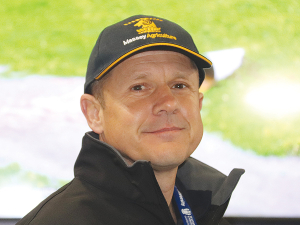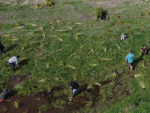Massey University is regarded by many as New Zealand’s leading tertiary education and research institute for the country’s primary industries.
According to the head of Massey’s school of agriculture and environment, Professor Paul Kenyon, the undergraduate programmes for this year are well underway.
This includes the traditional programmes of the Bachelor of Agricultural Science, Bachelor of Horticultural Science, Bachelor of Agribusiness and Bachelor of Animal Science. He says this year the school has launched a new programme, the Bachelor of Earth and Environmental Science (BEES).
Kenyon says the new degree includes two majors, land and water science and geoscience and offers students a pathway to new knowledge and skills in the relationship between landscapes and primary production. BEES sits alongside and aligns with the school’s agriculture, horticulture and animal science programmes, “creating new sustainability pathways for graduates”.
“Our primary industries need future employees that understand not only environmental management and science but also understand our production systems,” he says.
Kenyon says a longstanding feature of Massey’s agriculturally based degree programs is the ability for those who wish to stay in the regions, to work while studying part time (sometimes full time) via distance. He says this allows those who wish to complete a degree, to do so while reducing the costs of travelling for their education and not needing to be away from home. For many students this is a great balance between gaining a tertiary education while being employed.
“Massey University is finding more students are taking the opportunity to enrol part time or full time via the distance/ online teaching modes and, with the cost of education growing, this option will continue to gain popularity,” he says.
Kenyon says university education should be led by research and Massey is experiencing significant growth in post graduate student numbers, both domestic and international students. He says these are helping to drive the large numbers of research projects Massey has underway and they help Massey maintain its number one ranking in agriculture.
He notes that this research is also an important part of the education of the undergraduate students, as it ensures they are learning world leading, up-to-date information in their programmes. Professor Kenyon says the research at Massey not only aims to increase productivity and profitability of our primary industries, it aims to do so in an environmentally sustainable and animal friendly manner.
“Massey’s research is heavily aligned to industry needs and contains a range of industry partners, ensuring the right questions are being asked and the solutions farmers need are being found. As part of creating pathways for the next generation, Massey has a strong working relationship with Horticulture and Agriculture Teachers Association (HATA) which has been positive for both groups,” he says.
Massey also partners with the New Zealand Young Farmers and the Rural Games Trust. With all groups, Massey co-creates educational material to not only educate the students but to also encourage young people to consider agriculture and horticulture as a future career option.
It is also creating material specifically for teachers to use in class for their NCEA teaching. Massey with its partners also has many hundreds of thousands of dollars in scholarships available for under- and post-graduate students to reduce the burden of education and to help ensure the primary industries attract the best and brightest.



















